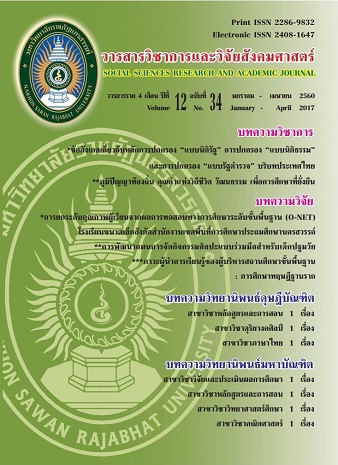ข้อสังเกตเกี่ยวกับหลักการปกครอง “แบบนิติรัฐ” การปกครอง “แบบนิติธรรม” และการปกครอง “แบบรัฐตำรวจ” บริบทประเทศไทย; The Observation about the Legal State Administration, the Rule of Law Administration and the Police State Administration in the Context of Tha
Main Article Content
บทคัดย่อ
บทคัดย่อ
การใช้อำนาจมาตรา 44 รัฐธรรมนูญแห่งราชอาณาจักรไทย พ.ศ.2557 (ฉบับชั่วคราว) ของหัวหน้า คสช. (คณะรักษาความสงบเรียบร้อยแห่งชาติ) อยู่ในฐานะ “รัฏฐาธิปัตย์” เหนือกว่าฝ่ายนิติบัญญัติ บริหารและอำนาจตุลาการ และการใช้อำนาจดังกล่าวนั้นก็ไม่สามารถเข้าตรวจสอบได้จะเป็นการสุ่มเสี่ยงต่อการ “ปกครองแบบรัฐตำรวจ" (Police State) ในลักษณะเช่นเดียวกับ มาตรา 17 ธรรมนูญการปกครองราชอาณาจักร พ.ศ. 2502 ซึ่ง หัวหน้า คสช.(คณะรักษาความสงบเรียบร้อยแห่งชาติ)พึงต้องใช้ความระมัดระวังในการใช้อำนาจเป็นอย่างยิ่งและการใช้อำนาจจะต้องอยู่ภายใต้หลักสมควรแก่เหตุหรือหลักความได้สัดส่วน กล่าวคือ การจำกัดสิทธิเสรีภาพของประชาชนจะต้องกระทำไปในสิ่งที่จำเป็นและเพื่อประโยชน์ส่วนรวมเท่านั้นและต้องเป็นมาตรการที่กฎหมายให้อำนาจฝ่ายปกครองออกมาใช้บังคับแก่ประชาชน ต้องเป็นมาตรการที่ก่อให้เกิดประโยชน์แก่มหาชน ยิ่งกว่าที่จะก่อให้เกิดความเสียหายแก่เอกชนดังนั้นรัฐธรรมนูญฉบับใหม่ในอนาคตตามที่รัฐธรรมนูญแห่งราชอาณาจักรไทย (ฉบับชั่วคราว) พุทธศักราช 2557 ได้กำหนดให้มีการจัดทำรัฐธรรมนูญฉบับใหม่ซึ่งเป็นรัฐธรรมนูญฉบับถาวร ผู้เขียนเห็นว่าผู้จัดทำรัฐธรรมนูญควรบัญญัติหลักการปกครองแบบนิติรัฐ (Legal State) กับหลักการปกครองแบบนิติธรรม (The Rule of Law) มาใช้ร่วมกันคือ เป็น “การปกครองแบบนิติรัฐที่ยึดหลักนิติธรรม”
Abstract
To exercise the power by Section 44 of the Constitution of the Kingdom of Thailand Buddhist era 2557 (temporary) by the leader of National Council for Peace and Order (NCPO) who has the sovereignty which exceed than Legislation power, Administration power and Judicial power and that power could not be inspected and risky to be the Police State same as Section 17 of the Constitution of the Kingdom Administration Buddhist era 2502.
The leader of NCPO must exercise the power carefully and adhere to the reason and balance that means must get suitable result as intended by the Legislation Power, the limit of the people liberty and rights must be necessary to use for the common interest only. The rule which authorized by the law to the administrative power to enforce the people must have the interest to community than individual damages.
Therefore, the writer has an opinion that the person who create the new Constitution law which specified to make by the Constitution of the Kingdom of Thailand (temporary) Buddhist era 2557 must legislates by the principle of the Legal State and the Rule of Law which combine to be “Administration by Legal State which adhere to the Rule of Law”.


